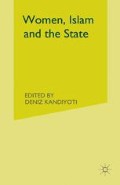Abstract
No discussion of state policies towards Islam and women would be complete without consideration of how attempts at socialist transformation have affected Muslim Societies.1 While the great majority of the world’s Muslims have lived under regimes opposed to socialism, there have been a significant number of cases in which revolutionary socialist states have ruled over Muslim populations. This has been true for the sizeable Muslim minorities in the USSR and China, and for two third-world states committed in the 1980s to a form of revolutionary change, officially termed ‘socialist orientation’, Afghanistan and the PDRY, where the populations were almost entirely Muslim. Between 35 per cent and 40 per cent of the population of what was one of the most important other ‘socialist oriented’ states, namely Ethiopia, was also Muslim. This commitment to revolutionary change turned out to be temporary: by 1990 all three ‘socialist-oriented’ states — Afghanistan, the PDRY, and Ethiopia — had abandoned their earlier policies. Their records of social transformation nonetheless merit informed analysis, if only because of the impact these policies had. Whatever the eventual fate of socialism and ‘socialist orientation’ it would appear that in the 1980s at least, between 10 per cent and 20 per cent of the world’s Muslims lived under socialist or ‘socialist-oriented’ regimes.
Access this chapter
Tax calculation will be finalised at checkout
Purchases are for personal use only
Preview
Unable to display preview. Download preview PDF.
Notes
See Theda Skocpol, States and Social Revolutions (Cambridge University Press, 1979) for an elaborated discussion of this question.
See M. Mann, ‘The Autonomous Power of the State: Its Origins, Mechanisms and Results’ in J. Hall (ed.), States in History (Oxford: Basil Blackwell, 1986).
On Soviet policy towards Islam see Shirin Akiner, Islamic Peoples of the Soviet Union (London: Kegan Paul, 1983);
Gregory Massell, The Surrogate Proletariat (Princeton University Press, 1974);
Alexander Bennigsen and S. Enders Wimbush, Muslim National Communities in the Soviet Union (Chicago: University of Chicago Press 1979);
Edward Mortimer, Faith and Power (London: Faber, 1982);
Fred Halliday, ‘Islam and Soviet Foreign Policy’, Journal of Communist Studies vol. 3 (March 1987) no. 1.
Fred Halliday, ‘Yemen’s Unfinished Revolution, Socialism in the South’, Merip Report, vol. 9, no. 8 (October 1979).
PDRY, Programme of the Unified Political Organisation, the National Front (Nottingham: Russell Press, 1977),
and PDRY, Documentos del I Congreso del Partido Socialista de Yemen (Editorial Moscú, 1979)
Fred Halliday, Arabia without Sultans (Harmondsworth: Penguin, 1974) gives the most detailed account of the national liberation struggle.
William Butler, Soviet Law (London: Butterworth, 1983);
Robert Stookey, South Yemen: A Marxist Republic in Asia (London: Croom Helm/Westview, 1982).
PDRY, The Political Report presented by Comrade Abdel Fattah Isma’il (Aden: Government Press, 1975).
See N. A. Shamiry, ‘The Judicial System in Democratic Yemen’, in B. Pridham (ed.), Contemporary Yemen: Politics and Historical Background (London: Croom Helm, and Centre for Arab — Gulf Studies, University of Exeter, July 1983),
See A. Bujra, The Politics of Stratification: A Study of Political Change in a South Arabian Town (Oxford University Press, 1971).
M. Molyneux, ‘Legal Reform and Socialist Revolution in Democratic Yemen: Women and The Family’, International Journal of the Sociology of Law (1985) 13, pp. 147–172.
See Fred Halliday, ‘The PDRY: the “Cuban Path” in Arabia’ in Gordon White et al., Revolutionary Socialist Development in the Third World (Sussex: Wheatsheaf, 1983).
Butler, Soviet Law, and P.Q. Hirst, ‘Law, Socialism and Rights’, in P. Carlen and M. Collinson (eds), Radical Issues in Criminology (Martin Robinson, 1980).
Doreen Ingrains, A Time In Arabia (London: Cox and Wyman, 1970)
World Bank, The PDRY: A Review of Economic and Social Development (Washington D.C., 1979).
World Bank, Development Report 1980 (Oxford University Press, 1980).
see Maxine Molyneux, State Policies and the Position of Women Workers in the PDRY 1967–1977 (Geneva: ILO, 1982).
Maxine Molyneux, ‘Women’s Emancipation under Socialism: a model for the Third World?’, World Development, vol. 9 (1981) no. 9/10.
Massell, The Surrogate Proletariat, Judith Stacey, Patriarchy and Socialist Revolution in China (Berkley: University of California Press, 1983).
Ludwig Liegle, The Family’s Role in Soviet Education (New York: Springer, 1970).
Neil Coulson, Conflicts and Tensions in Islamic Jurisprudence (University of Chicago, 1969)
and Lois Beck and Nikki Keddie, Women in the Muslim World (University of Chicago, 1979).
General Union of Yemeni Women Documents of the GUYW (Aden: Government Press, 1976).
See PDRY, The Constitution (Aden: Government Press, 1975, and amended, 1978).
See Helen Lackner, PDRY Yemen: Outpost of Socialist Development in Arabia (London: Ithaca Press, 1985) for a discussion of the GUYW.
Norman Anderson, Law Reform in the Muslim World (University of London: Athlone Press, 1976);
Isam Ghanem, ‘A Note on Law no. I, Concerning the Family, Peoples Democratic Republic of Yemen’, Arabian Studies, no. III (1976) pp. 191–6.
S. H. Amin, Law and Justice in Contemporary Yemen (Glasgow: Roysten Press, 1987).
See Maxine Molyneux, ‘State Policy and the Position of Women in South Yemen’, Peuples Méditerranéens, no. 12 (July/September 1980).
Barry Hindess and Paul Hirst, Mode of Production and Social Formation (London: Macmillan, 1977).
See for example, Judith Tucker, Women in Nineteenth Century Egypt (Cambridge University Press, 1985).
Editor information
Editors and Affiliations
Copyright information
© 1991 Palgrave Macmillan, a division of Macmillan Publishers Limited
About this chapter
Cite this chapter
Molyneux, M. (1991). The Law, the State and Socialist Policies with Regard to Women; the Case of the People’s Democratic Republic of Yemen 1967–1990. In: Kandiyoti, D. (eds) Women, Islam and the State. Palgrave Macmillan, London. https://doi.org/10.1007/978-1-349-21178-4_9
Download citation
DOI: https://doi.org/10.1007/978-1-349-21178-4_9
Publisher Name: Palgrave Macmillan, London
Print ISBN: 978-0-333-52696-5
Online ISBN: 978-1-349-21178-4
eBook Packages: Palgrave Social & Cultural Studies CollectionSocial Sciences (R0)

